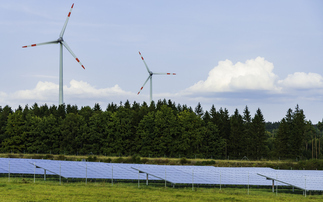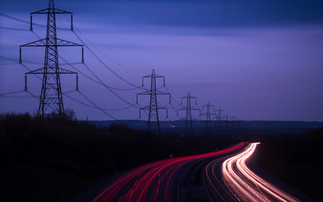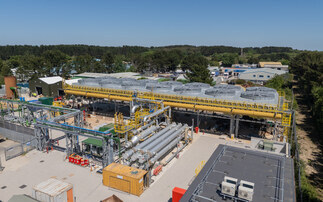Former Climate Change Committee chair optimistic on continuing falls in renewables costs and suggests smart meters should be opt-out rather than opt-in
Widely-available low cost renewable power is on the horizon and intermittency need not be a barrier to taking advantage of plummeting energy costs, according to former chair of the UK's Climate Change Commission (CCC), Lord Adair Turner.
Speaking in London yesterday, Lord Turner said work he had overseen since beginning his role as chair of the Energy Transitions Commission (ETC) last year suggested 80-90 per cent renewables-powered grids were achievable in the UK within the next 20 years at a competitive cost.
Established in September 2015 to help push forward the transition to low carbon economy, the ETC is a global expert body made up of 27 environmental and clean energy leaders, including former US Vice President Al Gore, UK economist Lord Nicholas Stern, and former Mexico President Felipe Calderon.
"What has struck me from the results of what we have done so far is a remarkable piece of good news," Lord Turner said yesterday. "We are convinced that we will be able to build in the next 20 years something close to wholly-renewable systems - 80 or 90 per cent intermittent renewable systems - even if you don't have a significant base load of nuclear, and also at a clearly sustainable cost in terms of the total cost."
Lord Turner said that when he was chair of the CCC nearly a decade ago he had not foreseen the kind of highly competitive renewable energy costs now being delivered at energy contract auctions around the world.
However, he said he was "now absolutely convinced given the cost trends occurring that we will be able to provide electricity at as low as $70 per MWh - 7 cents per KWh - with the full cost of that intermittency dealt with, and with systems that are 80-90 per cent renewables".
Lord Turner's comments came at an event organised by smart meter body Smart Energy GB in London yesterday.
The former CBI director general also said the rollout of smart meters for businesses and residents was "absolutely essential" to help cut costs and support the decarbonisation of the UK's electricity supply, but suggested the rollout should be accelerated.
In order to speed up deployment, he said smart meters should be installed in households and businesses on an 'opt-out' basis rather than the current voluntary approach where customers have to be offered a smart meter.
"I have to say my own preference then would be to just get on with it and get it [smart meters] into every home as quickly as possible," he said. "I know we are essentially going down the voluntary route - 'do you want a smart meter?' - but given that we are not going to charge anybody the capital cost of these smart meters, it is not clear to me that anybody would be disadvantaged by being told 'you are having a smart meter whether you like it or not'. You can then decide whether you want to use the facility of it to reduce your costs."
The government's smart meter scheme obliges energy providers to offer every household and small business across Scotland, England and Wales a smart meter by December 2020, with over 50 million smart meters set to be installed in households and businesses across the country.
However, although the capital costs of the smart meters are covered by the government, having a smart meter installed is optional, rather than mandatory, and there are concerns the 2020 target could be missed following a series of set-backs and delays to the programme.
Lord Turner compared his preferred approach for the smart meter rollout to the way in which auto-enrolment into company pensions now operates, after that policy was put into force while he was chairman of the UK Pensions Commission.
"We dealt with this problem of the balance between voluntarism and compulsion by saying: 'here is something which bluntly is good for you'," he explained. "You still have the option if you want to not to have it, but let's try and get rid of the inertia."
The Institute of Directors recently called for a review of the UK's £11bn smart meter rollout programme, citing "unnecessarily complex technology" and the existence of supposedly cheaper technology on the market.









